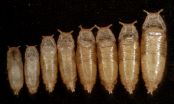Body size requires hormones under control
2014-11-25
(Press-News.org) The proper regulation of body size is of fundamental importance, but the mechanisms that stop growth are still unclear. In a study now published in the scientific journal eLife*, a research group from Instituto Gulbenkian de Ciência (IGC), led by Christen Mirth, shed new light on how animals regulate body size. The researchers uncovered important clues about the molecular mechanisms triggered by environmental conditions that ultimately affect final body size. They show that the timing of synthesis of a steroid hormone called ecdysone is sensitive to nutrition in the fruit fly and describe the key proteins involved in this regulatory mechanism. This study explains what causes hormones to become environmentally-sensitive and provides important clues on body size regulation.
Growth in insects and many other animals depends on environmental factors, such as the availability of food during development. These environmental factors in turn regulate two independent physiological mechanisms by controlling the synthesis of two hormones: insulin and ecdysone. Insulin controls how fast an animal grows in response to nutrition, but the time at which the animal initiates metamorphosis, thereby stopping growth, is determined by an environmentally-sensitive peak of ecdysone. Now, researchers from Christen Mirth's laboratory discovered how these two processes talk to each other, all due to the location of a protein inside the gland cells, where ecdysone is synthetized during a larval stage. Usually, insulin levels increase after a meal. When this happens, at the molecular level, a protein called FoxO acts as an insulin sensor, leaves the nucleus of the gland cells and activates a cascade of events that culminate in the growth of the organism. The research team now discovered that when the fruit fly larvae are starved, FoxO is kept within the cell nucleus, blocking the production of ecdysone. If starvation occurs during a phase that precedes metamorphosis, called 'critical weight', ecdysone synthesis is greatly delayed and larvae initiate metamorphosis much later than normal.
Takashi Koyama, first author in this study, says: "There are many nutrition-dependent developmental events in many organisms. I believe the mechanism we found is potentially common across a wide range of animals". Christen Mirth adds: "In flies and other insects a number of other environmental factors regulate the synthesis of ecdysone, such as temperature, infection and oxygen levels. We would like to know if these environmental conditions act through the same or parallel mechanisms to control developmental timing. This would provide us with a detailed view of how a complex suite of environmental conditions fine tune development to alter the final size of the adult".
INFORMATION:
This study was developed in collaboration with Alekos Athanasiadis from Instituto Gulbenkian de Ciência (Portugal) and Alexander Shingleton from Lake Forest College (USA). This research was funded by Fundação para a Ciência e a Tecnologia (FCT; Portugal) and the Calouste Gulbenkian Foundation (FCG; Portugal).
* Koyama, T., Rodrigues, M. A., Athanasiadis, A., Shingleton, A. W., and Mirth, C. K. (2014) Nutritional control of body size through FoxO-Ultraspiracle mediated ecdysone biosynthesis. eLife 3:e03091 http://dx.doi.org/10.7554/eLife.03091
[Attachments] See images for this press release:

ELSE PRESS RELEASES FROM THIS DATE:
2014-11-25
People's views on income inequality and wealth distribution may have little to do with how much money they have in the bank and a lot to do with how wealthy they feel in comparison to their friends and neighbors, according to new findings published in Psychological Science, a journal of the Association for Psychological Science.
"Our research shows that subjective feelings of wealth or poverty motivate people's attitudes toward redistribution, quite independently of objective self-interest," says psychological scientist and study co-author Keith Payne of the University ...
2014-11-25
WASHINGTON, Nov. 25, 2014 -- Your beer may attract annoying fruit flies, but listen up before you give them a swat. Researchers found the yeast cells in beer are producing odor compounds -- acetate esters -- that lure flies and that could lead to the best beer you haven't even tasted yet. This week's Speaking of Chemistry explains why. Check it out at http://youtu.be/HQNlGuZvCvA.
Speaking of Chemistry is a production of Chemical & Engineering News, a weekly magazine of the American Chemical Society. The program features fascinating, weird and otherwise interesting chemistry ...
2014-11-25
Bitcoin is the new money: minted and exchanged on the Internet. Faster and cheaper than a bank, the service is attracting attention from all over the world. But a big question remains: are the transactions really anonymous? Several research groups worldwide have shown that it is possible to find out which transactions belong together, even if the client uses different pseudonyms. However it was not clear if it is also possible to reveal the IP address behind each transaction. This has changed: researchers at the University of Luxembourg have now demonstrated how this is ...
2014-11-25
The study at Sahlgrenska Academy, University of Gothenburg, was based on the Swedish National Epilepsy Surgery Register, which includes all cases since 1990. The researchers reviewed data for the 865 patients who were operated on at Sweden's six epilepsy surgery clinics from 1996 to 2010.
The purpose of surgery is to enable a person with severe epilepsy to be free of seizures or to reduce their frequency to the point that (s)he can enjoy better quality of life.
Downward trend
Only 3% (25) of the patients suffered lasting complications. A comparison with a previous ...
2014-11-25
Researchers at KU Leuven's Centre for Surface Chemistry and Catalysis have successfully converted sawdust into building blocks for gasoline. Using a new chemical process, they were able to convert the cellulose in sawdust into hydrocarbon chains. These hydrocarbons can be used as an additive in gasoline, or as a component in plastics. The researchers reported their findings in the journal Energy & Environmental Science.
Cellulose is the main substance in plant matter and is present in all non-edible plant parts of wood, straw, grass, cotton and old paper. "At the molecular ...
2014-11-25
Results presented November 19 by University of Colorado Cancer Center investigator Daniel Pollyea, MD, MS, at the 26th European Organisation for Research and Treatment of Cancer Symposium in Barcelona show "extremely promising" early phase 1 clinical trial results for the investigational drug AG-120 against the subset of patients with acute myeloid leukemia (AML) harboring mutations in the gene IDH1. The finding builds on phase 1 results of a related drug, AG-221, against IDH2 mutations, presented at the most recent meeting of the American Association for Cancer Research. ...
2014-11-25
After mining the genetic records of thousands of breast cancer patients, researchers from the Johns Hopkins Kimmel Cancer Center have identified a gene whose presence may explain why some breast cancers are resistant to tamoxifen, a widely used hormone treatment generally used after surgery, radiation and other chemotherapy.
The gene, called MACROD2, might also be useful in screening for some aggressive forms of breast cancers, and, someday, offering a new target for therapy, says Ben Ho Park, M.D., Ph.D., an associate professor of oncology in the Kimmel Cancer Center's ...
2014-11-25
A new expert panel report, Policing Canada in the 21st Century: New Policing for New Challenges, released today by the Council of Canadian Academies, details the complexity and global nature of policing in the modern age. Overall, a 12-member Expert Panel determined that safety and security cannot just rest with Canada's policing services. Specialists, public and private security services, and other first responders all have a vital role to play in an interconnected safety and security web. This transition has already begun in Canada and around the world. A central challenge ...
2014-11-25
The treatment of people who cannot keep their gambling habits in check is often complicated because they also tend to suffer from personality disorders. So says Meredith Brown of Monash University in Australia, in a review in Springer's Journal of Gambling Studies.
Problem gambling creates a multitude of intrapersonal, interpersonal and social difficulties for the roughly 2.3 percent of the population internationally that suffers from this behavior. Previous research has shown that people with gambling problems suffer from a range of psychiatric disorders affecting their ...
2014-11-25
Genes make proteins and proteins tell your body's cells what to do: one talks to the next, which talks to the next, and to the next. Like a game of telephone, researchers call these "signaling pathways". Abnormalities in these signaling pathways can cause the growth and survival of cancer cells. Commonly, mutations or rearrangements of genes in the MAPK signaling pathway create cancer's fast growth, and alterations in the PI3K signaling pathway allow cancer cells to survive into virtual immortality.
Of course, researchers have extensively targeted these two signaling ...
LAST 30 PRESS RELEASES:
[Press-News.org] Body size requires hormones under control


